-
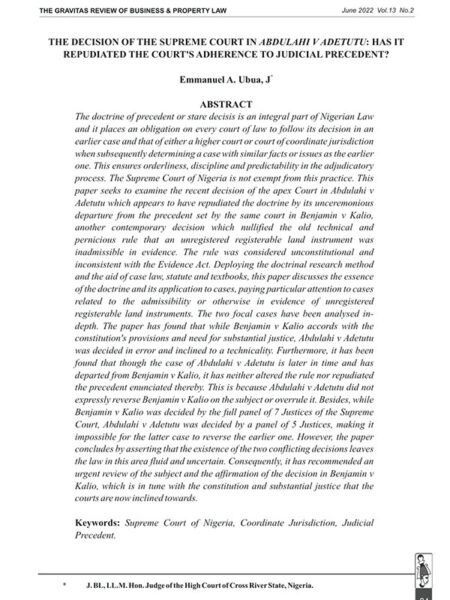
The Decision of The Supreme Court in Abdulahi v Adetutu: Has it Repudiated the Court’s Adherence to Judicial Precedent?
0₦2,500.00Honourable Justice Emmanuel Ubua of the High Court of Cross River State, in his article, The Decision of The Supreme Court in Abdulahi v Adetutu: Has it Repudiated the Court’s Adherence to Judicial Precedent? examines the decision of the Supreme Court in Abdulahi v Adetutu which appears to have repudiated the doctrine of stare decisis by its unceremonious departure from the precedent set by the same court in Benjamin v Kalio. The Supreme Court in Kalio nullified the old technical and pernicious rule that an unregistered registerable land instrument was inadmissible in evidence. The rule was considered unconstitutional and inconsistent with the Evidence Act. However, in the case of Abdulahi v Adetutu which was decided later, the Supreme Court seems to have somersaulted when it held that an unregistered instrument was inadmissible in evidence for breaching provisions of the Land Instruments Registration Law. Hon Justice Ubua comprehensively reviews the cases of Kalio and Adetutu and posits that while Kalio accords with constitutional provisions and the need for substantial justice, Adetutu was decided in error and inclined to technicality. Hon Justice Ubua recommends an urgent affirmation of the decision in Kalio, which is in tune with the constitution and substantial justice.
-
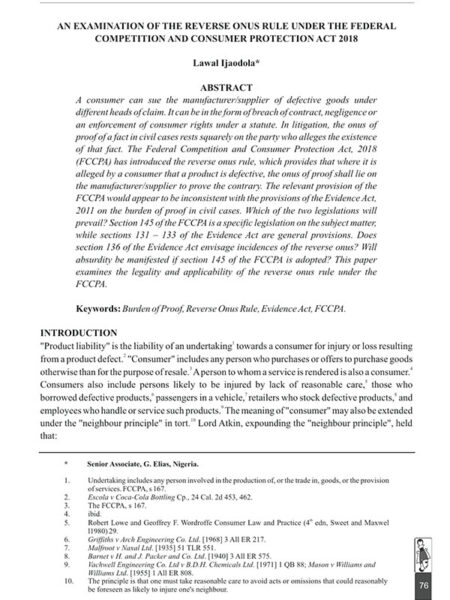
An Examination of The Reverse Onus Rule Under the Federal Competition and Consumer Protection Act 2018
0₦2,500.00Lawal Ijaodola, Senior Associate, G. Elias, in his article, An Examination of The Reverse Onus Rule Under the Federal Competition and Consumer Protection Act 2018, notes that a consumer can sue the manufacturer/supplier of defective goods under different causes of action. It can be in breach of contract, negligence, or an enforcement of consumer rights under a statute. In litigation, the onus of proof of a fact in civil cases rests squarely on the party who alleges the existence of that fact. The Federal Competition and Consumer Protection Act 2018 (FCCPA) has introduced the reverse onus rule, which provides that where it is alleged by a consumer that a product is defective, the onus of proof shall lie on the manufacturer/supplier to prove that the product is not defective. The relevant provision of the FCCPA would appear to be inconsistent with the provisions of the Evidence Act 2011 on the burden of proof in civil cases. Which of the two laws will prevail? Section 145 of the FCCPA is a specific legislation on the subject matter, while sections 131 – 133 of the Evidence Act are general provisions. Does section 136 of the Evidence Act envisage incidences of the reverse onus? Will absurdity be manifested if section 145 of the FCCPA is adopted? Lawal examines the contending issues and the legality and applicability of the reverse onus rule under the FCCPA.
-
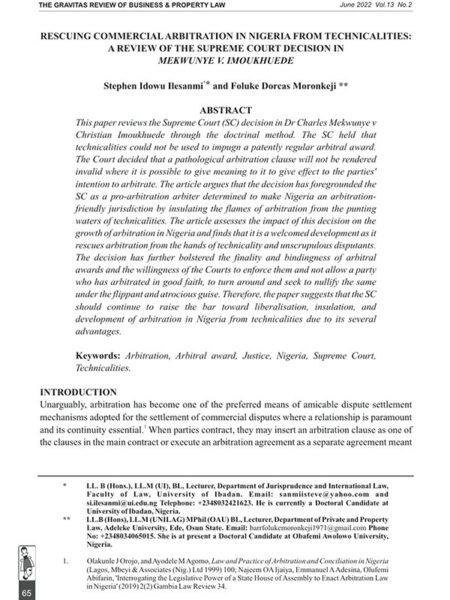
Rescuing Commercial Arbitration in Nigeria from Technicalities: A Review of the Supreme Court Decision in Mekwunye v Imoukhuede
0₦2,500.00Stephen Ilesanmi, Lecturer, University of Ibadan Nigeria and Foluke Moronkeji, Lecturer, Adeleke University Ede Nigeria, in their article, Rescuing Commercial Arbitration in Nigeria from Technicalities: A Review of the Supreme Court Decision in Mekwunye v Imoukhuede, review the Supreme Court’s (SC) decision in Mekwunye v Imoukhuede where the SC held that technicalities could not be used to impugn a patently regular arbitral award. The Court held that an arbitration clause would not be rendered invalid where it is possible to give meaning to it to give effect to the parties’ intention to arbitrate. Ilesanmi and Moronkeji argue that the SC decision has rescued arbitration from technicalities. They note that the decision has further bolstered the finality and bindingness of arbitral awards and the willingness of the Courts to enforce them and not allow a party who has arbitrated in good faith, to turn around and seek to nullify the same under flippant and atrocious guises.
-
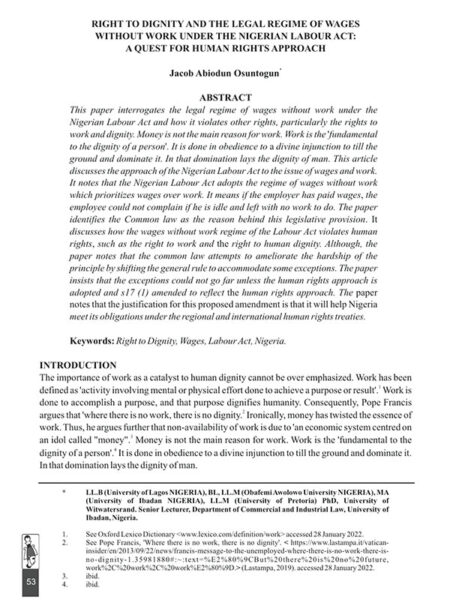
Right to Dignity and the Legal Regime of Wages Without Work Under the Nigerian Labour Act: A Quest for Human Rights Approach
0₦2,500.00Dr Jacob Osuntogun, Senior Lecturer, Department of Commercial and Industrial Law, University of Ibadan Nigeria, in his paper, Right to Dignity and the Legal Regime of Wages Without Work Under the Nigerian Labour Act: A Quest for Human Rights Approach, interrogates the legal regime of wages without work under the Nigerian Labour Act and how it violates other rights, particularly the rights to work and dignity. He argues that ‘money is not the main reason for work’ and work is fundamental to a person’s dignity. Dr Osuntogun notes that the Nigerian Labour Act prioritises the payment of wages. If the employer has paid wages, the employee could not complain if he is idle and left with no work to do. He argues that the wages without work regime of the Labour Act violates human rights and advocates an amendment of the Labour Act for Nigeria to meet its obligations under regional and international human rights treaties.
-
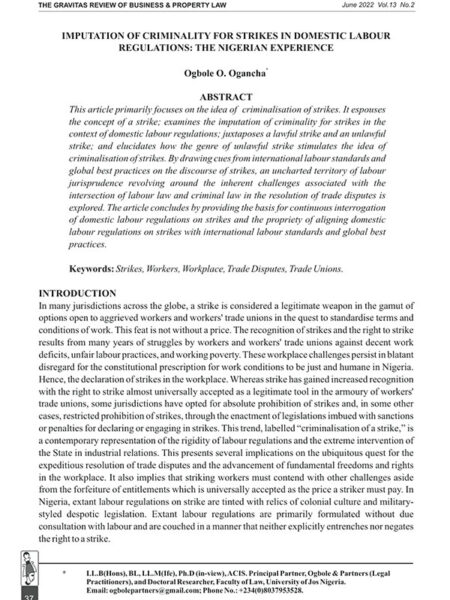
Imputation of Criminality for Strikes in Domestic Labour Regulations: The Nigerian Experience
0₦2,500.00Ogbole Ogancha of Ogbole & Partners, and Doctoral Researcher at the Faculty of Law, University of Jos Nigeria, in his article, Imputation of Criminality for Strikes in Domestic Labour Regulations: The Nigerian Experience, examines the imputation of criminality for strikes in the context of domestic labour regulations. He considers the concept of ‘lawful strikes’ and ‘unlawful strikes’ and argues that ‘unlawful strikes’ stimulate the idea of criminalisation of strikes. Ogancha explores Nigerian laws and regulations on the issue. Drawing cues from international labour standards and global best practices, he concludes that the criminalisation of strikes is not a sufficient or ideal deterrence. A progressive approach lies in the speedy identification of the causes of workers’ discontent.
-
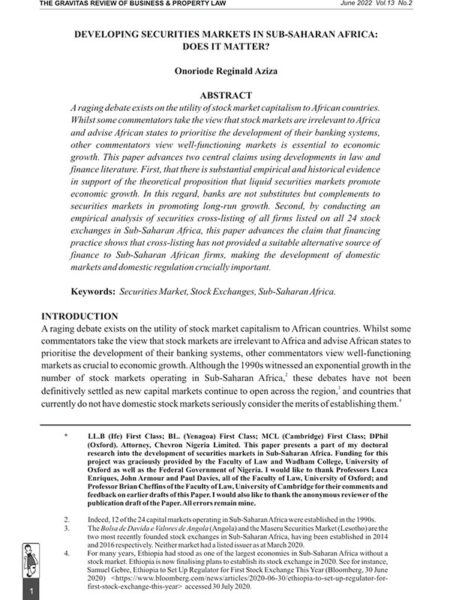
Developing Securities Markets in Sub-Saharan Africa: Does it Matter?
0₦2,500.00Dr Onoriode Aziza of Chevron Nigeria, in his landmark study, Developing Securities Markets in Sub-Saharan Africa: Does it Matter? notes the raging debate on the utility of stock market capitalism to African countries. Whilst some commentators take the view that stock markets are irrelevant to Africa and advise African states to prioritise the development of their banking systems, other commentators view well-functioning markets as essential to economic growth. Dr Aziza advances two central claims using developments in law and finance. First, there is substantial empirical and historical evidence supporting the theoretical proposition that liquid securities markets promote economic growth. In this regard, banks are not substitutes but complement securities markets in promoting long-run growth. Second, by conducting an empirical analysis of securities cross-listing of all firms listed on all 24 stock exchanges in Sub-Saharan Africa, Dr Aziza advances the claim that cross-listing has not provided a suitable alternative source of finance to Sub-Saharan African firms, making the development of domestic markets and regulation crucially important.
-
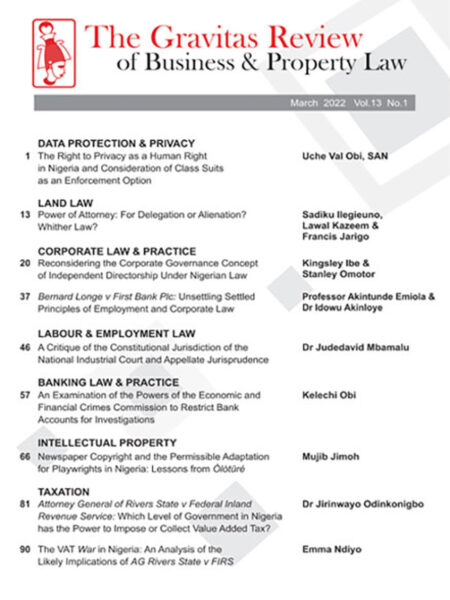
The Gravitas Review of Business & Property Law Vol.13 No.1 – Print
0₦5,000.00In this issue of The Gravitas Review of Business & Property Law Vol.13 No.1, there are well researched articles on:
- Data Protection & Privacy
- Land Law
- Corporate Law & Practice
- Banking Law & Practice
- Labour & Employment Law
- Intellectual Property
- Taxation
-

The Gravitas Review of Business & Property Law Vol.13 No.1 – E-Book
0₦5,000.00In this issue of The Gravitas Review of Business & Property Law Vol.13 No.1, there are well researched articles on:
- Data Protection & Privacy
- Land Law
- Corporate Law & Practice
- Banking Law & Practice
- Labour & Employment Law
- Intellectual Property
- Taxation
-

The Gravitas Review of Business & Property Law Vol.13 No.1
0₦5,000.00In this issue of The Gravitas Review of Business & Property Law Vol.13 No.1, there are well researched articles on:
- Data Protection & Privacy
- Land Law
- Corporate Law & Practice
- Banking Law & Practice
- Labour & Employment Law
- Intellectual Property
- Taxation
-
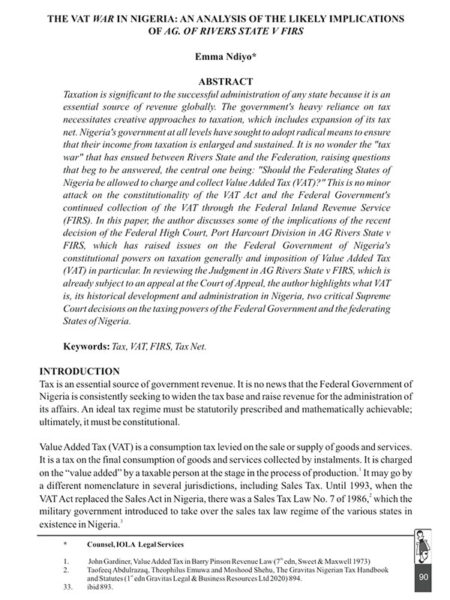
The VAT War in Nigeria: An Analysis of the Likely Implications of AG Rivers State v FIRS
0₦2,500.00Emma Ndiyo, Counsel at IOLA Legal Services, weighs in on the VAT debate in her article, The VAT War in Nigeria: An Analysis of the Likely Implications of AG Rivers State v FIRS. She discusses some of the implications of the recent decision of the Federal High Court in AG Rivers State v FIRS which has raised issues on the Federal Government of Nigeria’s constitutional powers on taxation generally and imposition of Value Added Tax (VAT) in particular. In reviewing AG Rivers State v FIRS, Emma highlights the historical development and administration of VAT in Nigeria. She reviews the Supreme Court decisions in AG Ogun State v Aberuagba and AG Lagos State v Eko Hotels on the taxing powers of the Federal Government and the federating states. She concludes with her thoughts on steps for improved tax administration in the country.
-
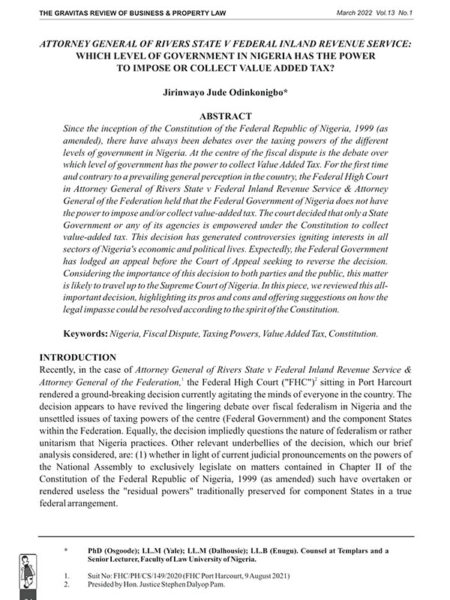
Attorney General of Rivers State v Federal Inland Revenue Service: Which Level of Government in Nigeria Has the Power to Impose or Collect Value Added Tax?
0₦2,500.00Dr Jirinwayo Jude Odinkonigbo of Templars and Faculty of Law University of Nigeria, in his article, Attorney General of Rivers State v Federal Inland Revenue Service: Which Level of Government in Nigeria Has the Power to Impose or Collect Value Added Tax?notes that since the inception of the 1999 Constitution of Nigeria, there have been debates over the taxing powers of the different levels of government, especially with regards to the Value Added Tax (VAT). For the first time and contrary to a prevailing general perception in the country, the Federal High Court in Attorney General of Rivers State v Federal Inland Revenue Service held that the Federal Government does not have the power to impose or collect VAT. The Court decided that only a State Government or its agency is empowered under the Constitution to collect VAT. Dr Odinkonigbo reviews this vital decision, highlighting its pros and cons and offering suggestions on how the legal impasse could be resolved according to the spirit of the Constitution.
-
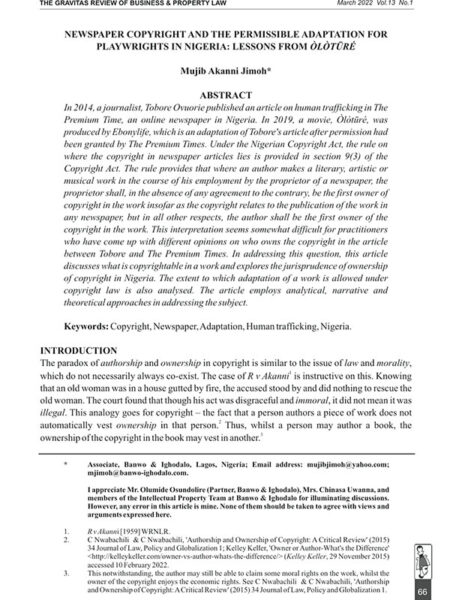
Newspaper Copyright and the Permissible Adaption for Playwrights in Nigeria: Lessons from Òlòtūré
0₦2,500.00Mujib Jimoh, Associate, Banwo & Ighodalo, Lagos, Nigeria, in his article, Newspaper Copyright and the Permissible Adaption for Playwrights in Nigeria: Lessons from Òlòtūré, explains that in 2014, a journalist, Tobore Ovuorie published an article on human trafficking in The Premium Times, an online newspaper in Nigeria. In 2019, a movie, Òlòtūré, which became a Netflix blockbuster, was produced by Ebonylife, which is an adaptation of Tobore’s article after permission had been granted by The Premium Times. Tobore posited that she ought to grant the permission. Under the Nigerian Copyright Act, the rule on where the copyright in newspaper articles lies is provided in section 9(3). There were differing interpretations of section 9(3) by practitioners. In this brilliant article, Mujib dissects the differing claims and interpretations. He discusses what is copyrightable in a work, the jurisprudence of ownership of copyright in Nigeria, and the extent to which adaptation of a work is allowed under copyright law.
The Gravitas Review of Business & Property Law



